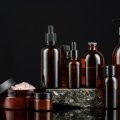1. Why Anti-Aging Serums Are a Skincare Essential
When it comes to maintaining healthy, youthful-looking skin, anti-aging serums are more than just a luxury—they’re a must-have in your daily skincare routine. These lightweight, fast-absorbing liquids are packed with powerful ingredients designed to target signs of aging like fine lines, wrinkles, dullness, and uneven texture.
What Do Anti-Aging Serums Do?
Anti-aging serums are formulated with concentrated active ingredients that go deeper into the skin compared to regular moisturizers. Their main job is to improve skin texture, boost hydration, stimulate collagen production, and fight free radical damage caused by environmental stressors like UV rays and pollution.
Key Benefits of Using an Anti-Aging Serum
| Benefit | How It Helps Your Skin |
|---|---|
| Reduces Fine Lines & Wrinkles | Ingredients like retinol and peptides help smooth out visible signs of aging. |
| Improves Skin Texture | Serums with exfoliating acids (like AHAs) can refine pores and even out rough patches. |
| Boosts Hydration | Hyaluronic acid draws moisture into the skin for a plumper, dewier look. |
| Evens Skin Tone | Vitamin C and niacinamide help fade dark spots and brighten dull complexions. |
| Protects Against Environmental Damage | Antioxidants shield the skin from pollution and sun-related aging factors. |
Why Serums Are Especially Popular in the U.S.
In the U.S., skincare lovers are all about customization and visible results—and serums deliver on both fronts. With so many options tailored for different skin types and concerns, American consumers have embraced serums as a key step between cleansing and moisturizing. Whether youre shopping at Sephora or scrolling through Amazon reviews, you’ll notice that anti-aging serums consistently rank among the top-rated products nationwide.
The Bottom Line: A Smart Addition to Any Routine
If youre looking to invest in skincare that works hard while feeling light on your face, an anti-aging serum is definitely worth considering. It’s never too early—or too late—to start using one. In the next section, we’ll dive into what ingredients to look for when choosing the best serum for your specific skin needs.
2. Key Ingredients to Look For in Anti-Aging Serums
When shopping for an anti-aging serum in the U.S., its easy to get overwhelmed by all the choices out there. The best way to narrow it down? Focus on what’s inside the bottle. Dermatologists often recommend looking for specific ingredients that have been proven to help fight signs of aging like fine lines, wrinkles, dryness, and dullness. Here’s a breakdown of some of the most effective ones and how they work for your skin.
Retinol
Retinol is a type of vitamin A and one of the most powerful ingredients for anti-aging. It works by speeding up cell turnover, which helps reduce the appearance of fine lines, smooths texture, and evens out skin tone over time. Retinol can be a bit strong at first, so if you’re new to it or have sensitive skin, start with a lower concentration and use it only a few times a week.
Hyaluronic Acid
This ingredient is a hydration hero. Hyaluronic acid attracts water to the skin, helping it stay plump and moisturized. As we age, our skin naturally loses moisture, which makes lines look more noticeable. Adding hyaluronic acid to your routine can give your skin that dewy, youthful glow while reducing dryness and tightness.
Peptides
Peptides are small proteins that help build up collagen and elastin—the two things that keep your skin firm and bouncy. As you age, collagen production slows down, leading to sagging and wrinkles. Peptides signal your skin to produce more collagen, improving elasticity and firmness over time.
Antioxidants (Vitamin C, Vitamin E, Green Tea Extract)
Antioxidants protect your skin from free radicals—unstable molecules caused by sun exposure and pollution that speed up aging. Vitamin C is especially popular because it not only protects but also brightens the skin and helps fade dark spots. When combined with other antioxidants like vitamin E or green tea extract, the benefits multiply.
Quick Ingredient Guide
| Ingredient | Main Benefit | Best For |
|---|---|---|
| Retinol | Smooths wrinkles & evens tone | Aging or textured skin |
| Hyaluronic Acid | Hydrates & plumps skin | Dry or dehydrated skin |
| Peptides | Boosts collagen & firms skin | Mature or sagging skin |
| Vitamin C | Brightens & protects against damage | Dull or uneven-toned skin |
When picking an anti-aging serum in the U.S., make sure at least one of these powerhouse ingredients is on the label. Depending on your specific skin concerns—whether its dryness, dullness, or fine lines—you can find a formula that targets exactly what you need.

3. Top 10 Anti-Aging Serums Loved Across the U.S.
Looking for an anti-aging serum that really works? Weve rounded up 10 of the most popular and effective serums used and loved by people all over the U.S. This list includes both affordable drugstore picks and high-end luxury favorites. Each product is backed by glowing user reviews, expert recommendations, and proven ingredients that target fine lines, wrinkles, dullness, and loss of firmness.
Top Picks at a Glance
| Product Name | Main Active Ingredients | Skin Type | Price Range | Why People Love It |
|---|---|---|---|---|
| L’Oréal Paris Revitalift 1.5% Pure Hyaluronic Acid Serum | Hyaluronic Acid | All Skin Types | $25–$30 | Deep hydration, plumps fine lines, great for daily use |
| The Ordinary Buffet + Copper Peptides 1% | Peptides, Amino Acids | Mature, Sensitive Skin | $28–$32 | A budget-friendly peptide complex with visible results |
| CeraVe Skin Renewing Retinol Serum | Encapsulated Retinol, Ceramides | Sensitive, Dry Skin | $18–$22 | Mild retinol formula that supports skin barrier health |
| Kiehl’s Midnight Recovery Concentrate | Squalane, Essential Oils | Dull, Dry Skin | $55–$78 | Nourishes overnight and boosts radiance by morning |
| SkinCeuticals C E Ferulic Serum | L-Ascorbic Acid (Vitamin C), Vitamin E, Ferulic Acid | Aging, Normal to Dry Skin | $169–$185 | A cult-favorite antioxidant serum with clinical backing |
| E.l.f. Holy Hydration! Triple-Acid Resurfacing Serum | Lactic Acid, Glycolic Acid, Salicylic Acid | Dull or Uneven Texture | $15–$18 | A gentle exfoliating serum at a super affordable price point |
| Tatcha The Dewy Serum Resurfacing and Plumping Treatment | Lactic Acid, Hyaluronic Acid, Hadasei-3™ Complex | Mature, Dehydrated Skin | $88–$95 | Smooths texture while delivering a dewy glow instantly |
| No7 Protect & Perfect Intense Advanced Serum | MATRIXYL 3000+, Retinyl Palmitate, Peptides | Aging Skin (40+) | $30–$35 | A drugstore gem clinically proven to reduce wrinkles over time |
| Estée Lauder Advanced Night Repair Synchronized Multi-Recovery Complex | Bifida Ferment Lysate, Hyaluronic Acid | All Skin Types | $85–$120 | Loved for its fast-absorbing formula that firms and renews skin overnight |
| Olay Regenerist Retinol24 Night Serum | Retinol Complex + Niacinamide | Normal to Oily Skin | $28–$35 | Fragrance-free night serum that smooths texture without irritation |
User Favorites & Expert Notes
If youre just starting out with anti-aging products, drugstore favorites like CeraVe and Olay offer gentle yet effective formulas that won’t break the bank. For those looking for more advanced results or luxurious textures, serums from brands like SkinCeuticals and Tatcha are worth the investment — especially if youre targeting deep-set wrinkles or significant loss of elasticity.
A Few Things to Keep in Mind:
- Your Skin Type: Choose serums formulated specifically for oily, dry, combination or sensitive skin.
- Main Concerns: Fine lines? Dark spots? Sagging skin? Pick a serum that targets your main issue.
- Sensitivity to Actives: Start slow with ingredients like retinol or acids if you’ve never used them before.
- Your Budget: There are effective options at every price point — its about consistency more than cost.
This top 10 list is designed to help you narrow down your choices based on real feedback and dermatologist insights. Whether youre new to skincare or upgrading your routine, theres a perfect anti-aging serum out there for you.
4. How to Choose the Right Serum for Your Skin Type
When it comes to anti-aging serums, theres no one-size-fits-all solution. Everyone’s skin is different, so finding a serum that works well with your specific skin type and concerns is key to seeing real results. Whether you have dry, oily, sensitive, or combination skin, here’s how to pick the right serum that suits your unique needs.
Understanding Your Skin Type
Before choosing a serum, it’s important to know your skin type. Heres a quick guide:
| Skin Type | Common Characteristics |
|---|---|
| Dry | Feels tight, rough patches, flaking |
| Oily | Shiny appearance, enlarged pores, prone to acne |
| Sensitive | Easily irritated, redness, stinging or burning sensation |
| Combination | Oily in T-zone (forehead, nose, chin), dry or normal elsewhere |
What to Look for in an Anti-Aging Serum Based on Your Skin Type
For Dry Skin
If your skin tends to feel tight and looks dull, go for serums packed with hydrating ingredients like hyaluronic acid, glycerin, or squalane. These help replenish moisture and smooth fine lines caused by dryness.
Recommended Ingredients:
- Hyaluronic Acid – deep hydration and plumping effect
- Squalane – lightweight moisturizer that mimics natural oils
- Vitamin E – antioxidant protection and soothing benefits
For Oily Skin
If youre dealing with excess shine and breakouts but still want anti-aging benefits, choose lightweight or oil-free serums. Look for exfoliating ingredients that unclog pores while boosting collagen.
Recommended Ingredients:
- Niacinamide – controls oil production and refines pores
- Retinol – helps reduce fine lines and acne simultaneously
- Salicylic Acid – clears pores and prevents breakouts
For Sensitive Skin
If your skin reacts easily, go for calming serums with fewer ingredients. Avoid strong actives like high-strength retinol unless its formulated for sensitive types.
Recommended Ingredients:
- Cica (Centella Asiatica) – calms inflammation and supports healing
- Aloe Vera – soothes irritation and hydrates gently
- Peptides – promote firmness without irritation
For Combination Skin
This type can be tricky since youre managing both dry and oily areas. Look for balanced formulas that hydrate without clogging pores. A light serum with multitasking ingredients is ideal.
Recommended Ingredients:
- Lactic Acid – gentle exfoliation and hydration boost
- Panthenol (Vitamin B5) – balances moisture levels across zones
- Green Tea Extract – antioxidants plus oil control benefits
The Importance of Personalization in Skincare
No matter your skin type, personalization is key. Consider your lifestyle (like sun exposure or stress), age-related concerns (like fine lines or uneven tone), and even climate where you live. Many top-rated U.S. serums now offer targeted formulas designed to meet these diverse needs—so don’t settle for less than what works best for YOU.
Your Next Step?
Narrow down your options based on the ingredients above and try out samples when possible. Always patch test new products first to avoid unwanted reactions. With the right serum tailored to your unique skin profile, youre one step closer to healthier, younger-looking skin.
5. Tips for Getting the Most Out of Your Serum
Using an anti-aging serum the right way can make a big difference in how effective it is. Here are some expert tips to help you maximize the benefits of your serum and get that youthful glow youre aiming for.
Apply to Clean, Damp Skin
Always start with a clean face. After cleansing, pat your skin gently with a towel but leave it slightly damp—this helps the serum absorb better and lock in moisture.
Use the Right Amount
With serums, less is more. Most formulas are highly concentrated, so you only need 1-2 drops or a pea-sized amount. Using too much won’t give faster results and may even irritate your skin.
Follow the Correct Order
The order of application matters. Heres a simple guide to layering your skincare products:
| Step | Product |
|---|---|
| 1 | Cleanser |
| 2 | Toner (optional) |
| 3 | Anti-Aging Serum |
| 4 | Moisturizer |
| 5 | Sunscreen (AM only) |
Time It Right
You can use most anti-aging serums both morning and night, but always read the label. Some ingredients like retinol are best used at night because they can make your skin sensitive to sunlight.
Be Consistent and Patient
The key to seeing results is consistency. Apply your serum daily—ideally twice a day—and give it time. Most people start noticing improvements in their skin within 4–6 weeks.
Pro Tip:
If youre using multiple serums (for example, one with Vitamin C in the morning and one with retinol at night), alternate them rather than layering all at once to avoid irritation.
Avoid Mixing Incompatible Ingredients
Certain ingredients don’t work well together. For example, avoid using Vitamin C and retinol at the same time unless your dermatologist advises otherwise. When in doubt, stick to proven combinations or consult a skincare expert.
A great anti-aging serum can be a game-changer when used properly. Follow these tips to make sure you’re getting every bit of benefit from your chosen product.

